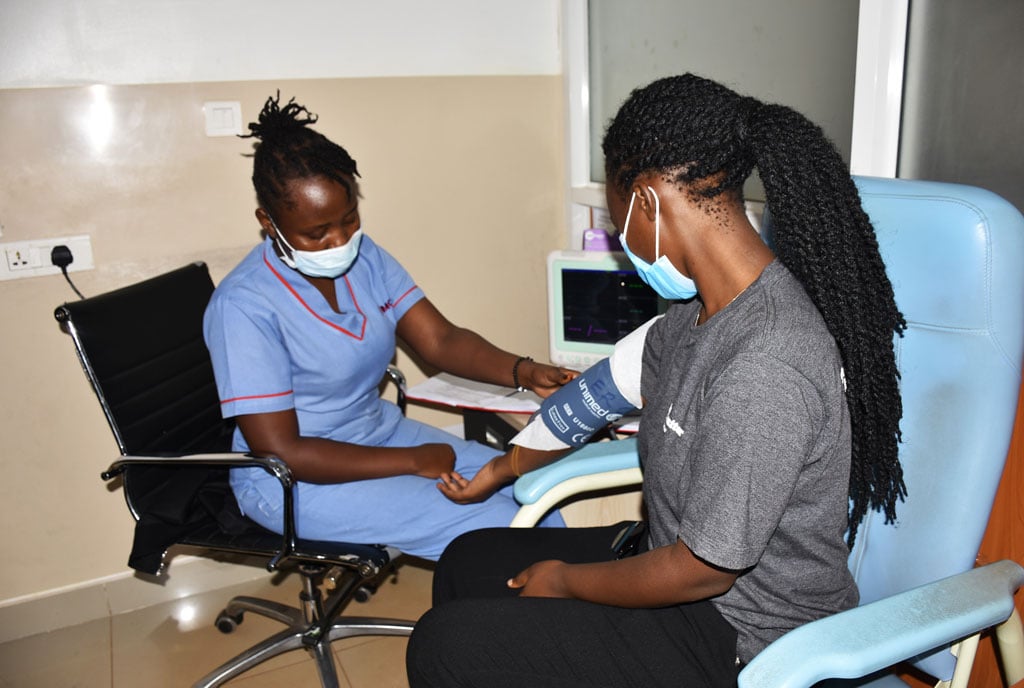Prime
The effects blood pressure has on your body

Self-monitoring can give you a stronger sense of control over your health. PHOTO | PROMISE TWINAMUKYE
What you need to know:
- High blood pressure is a big deal because it puts stress on your heart and arteries, even if you do not feel any different. That added stress can raise your chances for a heart attack or stroke.
Arteries carry blood from the heart to other parts of the body. When the heart pumps blood through the arteries, this blood puts pressure on the artery walls. Blood pressure, therefore, is the pressure of blood pushing against the walls of the arteries.
A normal blood pressure level is that which measures less than 120/80 mmHg. Blood pressure changes throughout the day based on your activities. High blood pressure, also referred to as hypertension, is blood pressure that is higher than normal. Having blood pressure measures that are consistently above normal may result in a diagnosis of high blood pressure (hypertension).
High blood pressure usually develops over time due to unhealthy lifestyle choices such as not getting enough regular physical activity. Some health conditions such as diabetes and obesity, can also increase one’s risk of developing high blood pressure. It can also occur during pregnancy.
Unfortunately, high blood pressure is a silent killer that usually has no warning signs or symptoms. Many people do not know they have it. The only way to know that you have it is by measuring your blood pressure.
The higher your blood pressure levels, the more risk you have of developing other health problems such as heart disease, heart attack and stroke. According to Centres for Disease Control (CDC), high blood pressure can seriously hurt important organs such as the heart, brain, kidneys, and eyes.
Heart problems
Dr Levi Kwarisiima, a cardiologist at Mulago National Referral Hospital, notes that high blood pressure damages arteries by making them less elastic. This decreases the flow of blood and oxygen to the heart and leads to heart disease.
“When the blood supply to your heart is blocked, the heart muscle begins to die because there is not enough oxygen reaching it. The longer the blood supply is cut off, the greater the damage,” he says.
This will then cause a heart attack and heart failure in the long run because the heart cannot pump enough blood and oxygen to your other organs.
Stroke and brain problems
High blood pressure can cause the arteries that supply blood and oxygen to the brain to burst or become blocked, causing a stroke.
Dr Kwarisiima says brain cells die during a stroke because they do not get enough oxygen. Stroke is not only fatal but also can cause serious disabilities in speech, movement, and other basic activities. Many people who develop high blood pressure during their midlife develop poor cognitive function and dementia later in life.
Kidney damage
People with diabetes, high blood pressure, or both have a high risk of developing chronic kidney disease. This is because high blood pressure can narrow blood vessels in the kidneys. It results in reduced blood flow and stops the kidneys from functioning well. As a result, the kidneys are not able to remove all waste and extra fluid from your body.
Eye damage
Like any other part of the body, the eye is just an end organ that is affected by severe hypertension. High blood pressure can damage blood vessels in the retina, causing hypertensive retinopathy.
According to Sheila Njuki, an ophthalmologist at Mildmay Hospital on Entebbe Road, pregnancy-induced hypertension is high blood pressure that occurs after 20 weeks of gestation in women with previously normal blood pressure. Preeclampsia is when there is high blood pressure associated with protein in urine.
According to the International Journal of Women’s Health and Reproductive Sciences (IJWHRS), preeclampsia or eclampsia, the most common medical complication of pregnancy, can affect the visual system as an end organ damage.
“Visual symptoms occur in 25 percent of patients with severe preeclampsia and 50 percent of patients with eclampsia. Visual system may be affected by hypertensive retinopathy, exudative retinal detachment, and cortical blindness,” part of the journal states.
Most of the effects of eclampsia and pregnancy induced hypertension on the eye are found on the retina, part of the eye on which the image is formed. Eclampsia also affects the brain and this combined with the effects of the retina.
“During a funduscopic examination, the retina is not supposed to have any blood but women who have had severe eclampsia can have retinal haemorrhage, detachment, vitreous haemorrhage, swelling of the optic nerve and vein occlusions,” Dr Njuki says.
All these will cause improper function of the retina since there is inadequate drainage of blood in the retina. In extreme cases, unresponsive pupils indicate a condition known as cortical blindness which has an irreversible effect on the brain.
Women with eclampsia may have blurred vision, double vision, flashing lights in the eye or complete loss of vision in severe cases but all these symptoms depend on what part of the eye has been affected.
Decreased vision, oedema and bleeding and these can be observed after an OCT, angiography to see the condition of the blood vessels, MRI to see the status of the brain
Retinal detachment if left untreated can cause vision loss and then progress to disability especially if both eyes are affected.
“Papilledema is an indication of increased intracranial pressure. This affects all the parts of the brain which in turn control all parts of the body. It is therefore to keep monitoring a patient with eclampsia until the oedema has cleared,” she says.
It is important to note that high blood pressure that is not managed can be fatal and also cause in-utero foetal death in pregnant mothers.




